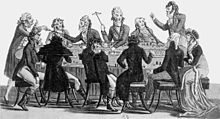Marche (roulette)
A (French) marche , or more rarely (German) a march , describes a sentence technique in roulette in which the player tries to predict the chances of the next coup from the past results, which are issued by the casinos as so-called permanences . Often one or more coups are first waited for and only after a certain event, the so-called signal coup , does one begin to bet.
Marches are either made with mass égale , i.e. H. constant stake, or played with progression , ie with variable stake. Marches can be specified for both the single chances and the multiple chances .
Popular marches
Play for easy chances
- La gagnante ( Eng .: the winner ): The player bets with the bank ; d. that is, he bets on the chance that occurred last. If the ball has fallen on Rouge , he will bet on Rouge again in the next coup ; the player relies on the occurrence of longer series. If the player wins, he often allowed to stand its use together with the previous gain, it offers the bank Paroli .
- La perdante (dt .: the loser): The player bets against the bank ; d. i.e., he is betting on the last chance that was lost. If the ball has fallen on Rouge , he will bet on Noir in the next coup ; the player speculates on the law of equalization (Equilibre) . He benefits from long intermittency , but long series bring losses, especially with the classic Martingale , here the player always relies on the Perdante and doubles his stake after each loss.
- L'avant dernière (en: the penultimate): The player bets on the chance that occurred in the penultimate coup; he benefits from long series and long intermittency, but loses if there are many series of two.
- La sauteuse (dt .: the jumper): The player always alternates between rouge and noir regardless of the fall of the ball.
A frequently played marche is as follows: The player observes the prospect of a chance and waits until a series that is currently in progress is ended by a counter strike. After every one or two coup he bets the Perdante , after every three or four series he bets the Gagnante - trusting the continuation of the series. After each series of five he pauses the game and only continues it again after the series has ended.
Number game
- Restanten , Retardaires (German: those who stay behind)
The player relies on numbers that have not been hit for a long time in the hope that these "overdue" numbers will soon "catch up" (so-called "maturity of chances", see player fallacy ).
- Favorites , dominants
The player bets on numbers that have occurred more frequently in the past than the average, in the hope that this "trend" will continue in the future.
A variant of the favorite game is as follows: In the first coup, the player bets one unit on the last number hit, in the second coup on the two last numbers hit, in the third coup on the last three numbers, and so on, until a number is occupied for the first time wins: Since in the course of a rotation (ie a series of 37 spins) generally only two thirds of the numbers, and half of them are hit several times (so-called two-thirds law ), occurs on average after the seventh or eighth coup the first profit one.
rating
If you stick to a marche when playing , you assume that a chance, after it has occurred or failed to occur one or more times, is more likely than the opposite chance.
However, this assumption is wrong: the roulette ball is a random machine with no memory ; that is, each new coup is completely independent of the previous coups . So if the ball z. B. has fallen to rouge five times in a row , the probability that rouge will fall again in the next coup has neither increased nor decreased, but is still 18/37.
To clarify: In contrast to the roulette ball or game dice , a pack of playing cards does have a “memory”: If a red card is drawn five times in a row from a pack of 52 sheets and these are not returned to the pile, it is Probability of drawing a red card again, of course, different from the original probability (1/2).
Although the assumption on which the game is based on a Marche is wrong, it is not harmful: the player does not improve his chances, but he also does not worsen them; in this respect, no marche is superior to another.
